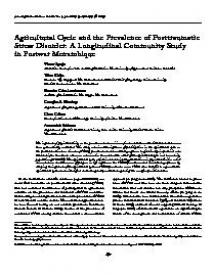Agricultural cycle and the prevalence of posttraumatic stress disorder: A longitudinal community study in postwar Mozambique
The influence of physical activity on the prevalence and remission of war-related mental disturbances has never been systematically evaluated. This study examined the influence ofparticipation in the agricultural cycle on the posttraumatic stress disorder (PTSD) prevalence and correlated symptoms longitudinally in postcivil war Mozambique. Prevalence rates were examined in the end and the outset of the agricultural cycle in a community population (N = 240). The agricultural cycle, which is characterized by fluctuations in physical activities, social connectedness, and the sense of purpose in life influences the PTSD prevalence and correlated symptoms. By studying the influence of the agricultural cycle on PTSD prevalence, severe PTSD cases that fail to respond to the agricultural cycle can be identified, and subsequently evaluated regarding the need for specialized care.
Geachte bezoeker,
De informatie die u nu opvraagt, kan door psychotraumanet niet aan u worden getoond. Dit kan verschillende redenen hebben,
waarvan (bescherming van het) auteursrecht de meeste voorkomende is. Wanneer het mogelijk is om u door te verwijzen naar de bron
van deze informatie, dan ziet u hier onder een link naar die plek.
Als er geen link staat, kunt u contact opnemen met de bibliotheek,
die u verder op weg kan helpen.
Met vriendelijke groet,
Het psychotraumanet-team.
In: Journal of Traumatic Stress, ISSN 0894-9867 | 22 | 3 | juni | 172–179
https://doi.org/10.1002/jts.20412


